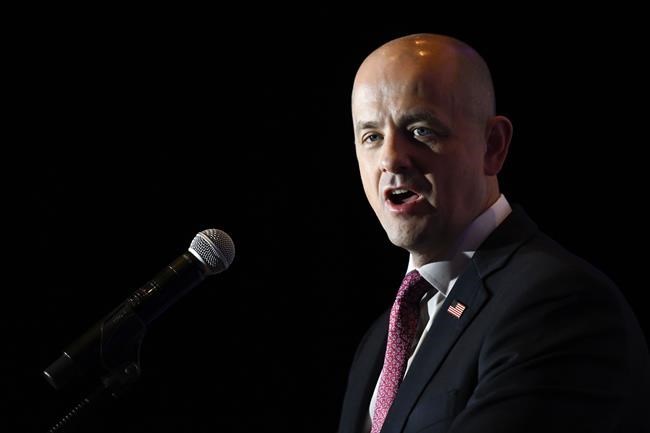SALT LAKE CITY (AP) — Utah Republican Mike Lee has been reelected to a third term in the U.S. Senate, defeating independent challenger Evan McMullin on Tuesday in the state's most closely watched Senate race in decades.
Lee’s win keeps Utah in Republican hands as the party vies for control of Congress and reflects that the libertarian-leaning conservative’s popularity has endured in Utah. His win indicates the majority of Utah voters were not swayed by McMullin’s criticisms of Lee’s second-term transformation, from a one-time opponent of former President Donald Trump to among his most loyal supporters.
In an emotionally raw victory speech, Lee said his victory was a rebuke of Democrats who have controlled Washington for the past two years. He said it put Republicans in a good position heading toward the next presidential election, when voters will be asked whether to give Democrats another four years in the White House.
“I look forward to 2024, when even the blue states are going to be saying ‘Heck no!' And that’s strong language in Utah,” Lee said on a stage alongside his family.
Across the nation, Senate races remained in flux. Republicans defended a seat in Ohio and Democrats defended one in New Hampshire, but a complete picture of next year’s U.S. Senate remained unclear as other critical battlegrounds were too early to call on Tuesday night.
McMullin’s formal backing from the Democratic party, which opted to back him instead of choosing a candidate, and attempts to exploit anti-Trump sentiment ultimately weren’t enough to unseat Lee, but in his concession speech he commended them for making the race competitive.
McMullin thanked the Democrats, Republicans and independents who supported him and said their unity made the race Utah’s most competitive in half a century. He said he hoped more voters, candidates and campaigns would focus on unifying people rather than leaning into politics of division “because America does stand at the crossroads of democracy and despotism.”
He mostly refrained from pointed remarks again Lee, yet he repeated his campaign trail message against divisiveness and threats to democracy.
“I truly hope he upholds his oath to the Constitution in his upcoming term,” McMullin said of Lee.
Utah voters were familiar with McMullin from his independent presidential campaign in 2016, when he won 21.5% of the vote in the in Utah by seizing on anti-Trump sentiment to deny Trump an outright majority in the state.
Six years later, McMullin’s bid focused largely on Lee’s text messages with Trump’s staff in the lead-up to the Jan. 6 attack on the U.S. Capitol. It ultimately wasn’t enough to score an upset in a state where voters and many political leaders have gradually grown to embrace Trump since 2016.
McMullin’s accusation that Lee had betrayed his oath of office when he became entangled in communications about how Trump could overturn President Joe Biden's 2020 win was front-of-mind for Lee's supporters at his election night event, including one who yelled, “You deserve an apology!” during the senator's victory speech.
“Thank you,” Lee said.
Lee comes from a prominent Utah political family. His father, Rex, served as U.S. Solicitor General under President Ronald Reagan and his brother, Thomas, is a former state Supreme Court Justice currently defending the state’s ban on transgender youth who want to participate in girls’ sports.
Since first being elected, Lee has cultivated a reputation for citing the U.S. Constitution frequently, often with the help of a pocket-sized edition he carries, and for advocating to limit the size of the federal government. He’s clung to those principles even when doing so has made him a lone “No” against otherwise unanimous votes in the Senate and contributed to the federal government shutting down. Two Republicans cited his unwillingness to compromise as a rationale for challenging him in Utah’s June primary and McMullin used his record to accuse him of being an obstructionist.
Lee’s defenders say his voting records exemplifies a willingness to fight for them and their values. He received endorsements from 48 Senate Republicans — all but Mitt Romney, who he’s represented Utah alongside since 2019. Lee’s victory over a self-identified conservative independent like McMullin suggests challenges could lie ahead for Romney should he decided to run for reelection in 2024.
Lee’s contest against McMullin was more competitive than either of Lee’s previous two races. He was first elected in 2010 during a Tea Party wave that he rode to unseat third-term Republican Sen. Bob Bennett at the Utah Republican Party’s convention that year and ultimately won the general election by 28.8 percentage points. He secured a second term in 2016, defeating Democrat Misty Snow by 31 percentage points.
He began that year as an avowed and public opponent of then-candidate Trump, even attempting to lead an effort to sabotage his nomination on the floor of the Republican National Convention. He voiced anger at Trump’s treatment of his friend and colleague U.S. Sen. Ted Cruz of Texas and said on national television that the “Muslim ban” plank of Trump’s 2016 campaign was religious discrimination and an affront to both his beliefs and the history of The Church of Jesus Christ of Latter-day Saints, whose members make up the majority of Utah’s population.
Lee gradually warmed to Trump as he began fulfilling the priorities such as nominating conservative justices to the U.S. Supreme Court, lowering taxes and embracing a conservative case for criminal justice reform. His ideological viewpoint won him support from political action committees like Americans for Prosperity and Club for Growth, which funneled millions into attack ads undercutting McMullin’s attempts to portray himself as an independent.
___
Follow AP’s coverage of the elections at: https://apnews.com/hub/2022-midterm-elections
Check out https://apnews.com/hub/explaining-the-elections to learn more about the issues and factors at play in the 2022 midterm elections.
Sam Metz, The Associated Press

